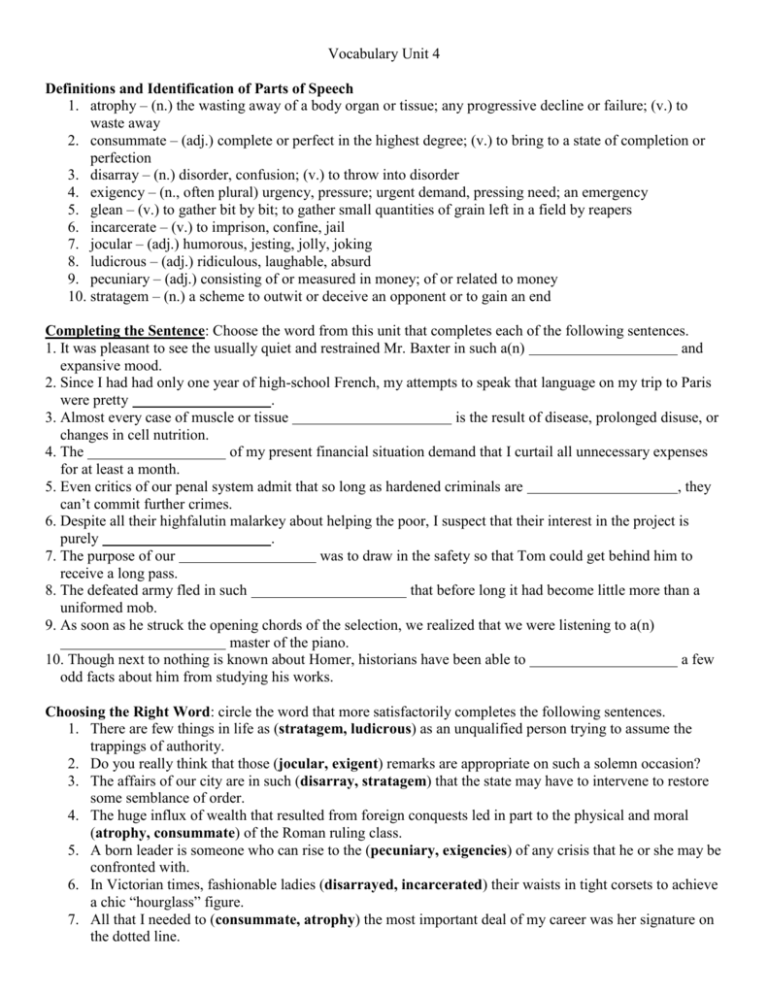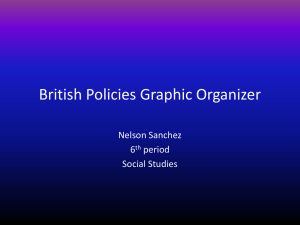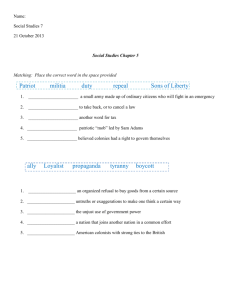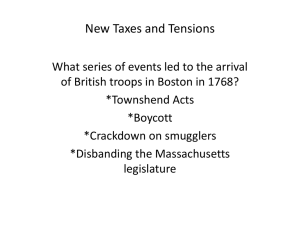handout
advertisement

Vocabulary Unit 4 Definitions and Identification of Parts of Speech 1. atrophy – (n.) the wasting away of a body organ or tissue; any progressive decline or failure; (v.) to waste away 2. consummate – (adj.) complete or perfect in the highest degree; (v.) to bring to a state of completion or perfection 3. disarray – (n.) disorder, confusion; (v.) to throw into disorder 4. exigency – (n., often plural) urgency, pressure; urgent demand, pressing need; an emergency 5. glean – (v.) to gather bit by bit; to gather small quantities of grain left in a field by reapers 6. incarcerate – (v.) to imprison, confine, jail 7. jocular – (adj.) humorous, jesting, jolly, joking 8. ludicrous – (adj.) ridiculous, laughable, absurd 9. pecuniary – (adj.) consisting of or measured in money; of or related to money 10. stratagem – (n.) a scheme to outwit or deceive an opponent or to gain an end Completing the Sentence: Choose the word from this unit that completes each of the following sentences. 1. It was pleasant to see the usually quiet and restrained Mr. Baxter in such a(n) and expansive mood. 2. Since I had had only one year of high-school French, my attempts to speak that language on my trip to Paris were pretty . 3. Almost every case of muscle or tissue is the result of disease, prolonged disuse, or changes in cell nutrition. 4. The of my present financial situation demand that I curtail all unnecessary expenses for at least a month. 5. Even critics of our penal system admit that so long as hardened criminals are , they can’t commit further crimes. 6. Despite all their highfalutin malarkey about helping the poor, I suspect that their interest in the project is purely . 7. The purpose of our was to draw in the safety so that Tom could get behind him to receive a long pass. 8. The defeated army fled in such that before long it had become little more than a uniformed mob. 9. As soon as he struck the opening chords of the selection, we realized that we were listening to a(n) master of the piano. 10. Though next to nothing is known about Homer, historians have been able to a few odd facts about him from studying his works. Choosing the Right Word: circle the word that more satisfactorily completes the following sentences. 1. There are few things in life as (stratagem, ludicrous) as an unqualified person trying to assume the trappings of authority. 2. Do you really think that those (jocular, exigent) remarks are appropriate on such a solemn occasion? 3. The affairs of our city are in such (disarray, stratagem) that the state may have to intervene to restore some semblance of order. 4. The huge influx of wealth that resulted from foreign conquests led in part to the physical and moral (atrophy, consummate) of the Roman ruling class. 5. A born leader is someone who can rise to the (pecuniary, exigencies) of any crisis that he or she may be confronted with. 6. In Victorian times, fashionable ladies (disarrayed, incarcerated) their waists in tight corsets to achieve a chic “hourglass” figure. 7. All that I needed to (consummate, atrophy) the most important deal of my career was her signature on the dotted line. 8. We were able to (consummate, glean) only a few shreds of useful information from his long, pretentious speech. 9. What we need to cope with this crisis is not cute (exigency, stratagems) but a bold, realistic plan and the courage to carry it out. 10. The only way we’ll really be able to increase productivity is to offer our employees a few solid (ludicrous, pecuniary) incentives to work harder. Vocabulary in Context: Read the following passage, then complete each statement that follows. Tea Time Although people today tend to think of colonial Boston as a bastion of revolutionary fervor, anti-British sentiment there grew slowly in the 1760s and 1770s. Not surprisingly, the provocation that eventually turned many loyal colonists against their mother country was pecuniary. In 1767 a financially strapped British Parliament placed duties, or taxes, on several items reported into the American colonies. This nettled the colonists because they had no representatives in the British Parliament to speak against the taxes on their behalf. The British government, on the other hand, saw the taxes as fair since it had incurred huge debts in the French and Indian War – a war the British believed benefitted their American subjects. In the end, the British government repeals all of the taxes except the one on tea. In 1773 the British provoked the colonists once again when they decreed that the British East India Company would be the exclusive seller of tea to the American colonies. Such a monopoly was a clear threat to the businesses of local tea merchants. When three shiploads of tea arrived in Boston Harbor in December 1773, the colonists developed a stratagem to foil the British. Before the tea could be sold, colonists disguised as Indians boarded the ships and emptied 324 chests of tea into the harbor. The next morning the empty chests were mere flotsam, and the British had not earned a penny on tea. This incident has since been given the jocular title the Boston Tea Party, but unlike most tea parties, it did nothing to bring the colonists and the British together. 1. Pecuniary most nearly means a. superficial c. premeditated b. financial d. unnecessary 2. Jocular most nearly means a. appropriate c. facetious b. primitive d. famous 4. The meaning of stratagem is a. ruse c. code b. costume d. company Synonyms: choose the word from this unit that is the same or most nearly that same in meaning as the boldface word or expression. 1. received financial compensation Antonyms: choose the word from this unit that is the most nearly opposite in meaning as the boldface word or expression. 9. a poignant story 2. the ill-conceived ruse 10. 3. collected tidbits of information 4. enthusiasm that withered 5. left the room in a state of disorganization 6. a handshake that clinched the deal 7. immured for years in a dank dungeon 8. the requirements of a wartime economy a humorless manner








